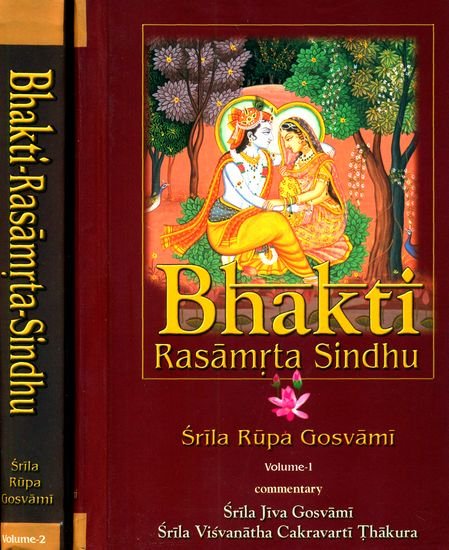Bhakti-rasamrta-sindhu
by Śrīla Rūpa Gosvāmī | 180,912 words
The English translation of the Sri Bhakti-rasamrta-sindhu verse 1.2.268; a medieval era Sanskrit book, written by Rupa Goswami (fl. 15th century) which represents a devotional (bhakti) masterpiece. In this work Goswami describes the nature and different forms of pure love (rasa) as well as various other topics on Vaishnavism and devotion.
Verse 1.2.268
Sanskrit text, Unicode transliteration and English translation:
पादौ हरेः क्षेत्र-पदानुसर्पणे
शिरो हृषीकेश-पदाभिवन्दने ।
कामं च दास्ये न तु काम-काम्यया
यथोत्तमःश्लोक-जनाश्रय रतिः ॥१.२.२६८॥pādau hareḥ kṣetra-padānusarpaṇe
śiro hṛṣīkeśa-padābhivandane |
kāmaṃ ca dāsye na tu kāma-kāmyayā
yathottamaḥśloka-janāśraya ratiḥ ||1.2.268||
English translation
An example of following many aṅgas equally is found in the Ninth Canto of Śrīmad-Bhāgavatam [9.4.18-20]:
“Mahārāja Ambarīṣa always engaged his mind in meditating upon the lotus feet of Kṛṣṇa, his words in describing the glories of the Lord, his hands in cleansing the Lord's temple, and his ears in hearing the words spoken by Kṛṣṇa or about Kṛṣṇa. He engaged his eyes in seeing the Deity of Kṛṣṇa, Kṛṣṇa's temples and Kṛṣṇa's places like Mathurā and Vṛndāvana, he engaged his sense of touch in touching the bodies of the Lord's devotees, he engaged his sense of smell in smelling the fragrance of tulasī offered to the Lord, and he engaged his tongue in tasting the Lord's prasāda. He engaged his legs in walking to the holy places and temples of the Lord, his head in bowing down before the Lord, and all his desires in serving the Lord, twenty-four hours a day. Indeed, Mahārāja Ambarīṣa never desired anything for his own sense gratification. He engaged all his senses in devotional service, in various engagements related to the Lord. This is the way to increase attachment for the Lord and be completely free from all material desires.”
